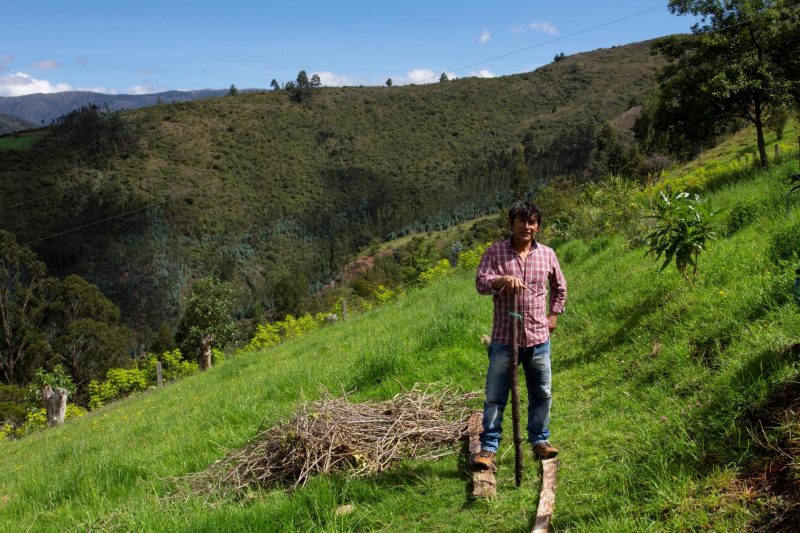by Martien Van Nieuwkoop, Global Director, Agriculture and Food Global Practice, World Bank
A once-in-a-century crisis, the COVID-19 pandemic has touched every region, industry, and aspect of life. No other crisis has wreaked as much economic havoc. The agri-food sector – from farming down to food processing and retailing – is not spared despite its status as an “essential service.” The impacts of COVID-19 on the food system are of particular concern as they impact most the food security and livelihoods of a large number of poor and vulnerable people.
Farmers and other food system actors (agri-businesses, traders, etc.) play a vital role in ensuring everyone can access safe, nutritious and affordable food. It is imperative that governments, with support from the international organizations and development partners, ensure that farmers have the necessary support — such as social safety nets, connections to markets, access to inputs, and financial support interventions — to continue operating in during COVID-19 and are able to recover and thrive after the pandemic.
The pandemic has increased risk of food insecurity in three main ways. First, COVID-19 has devastated the labor market. Lockdowns, movement restrictions, and reduced demand have resulted in widespread job losses and pay cuts. Income losses reduce access to food, especially for the poor and vulnerable, who spend proportionally more of their income on food. To make things worse, COVID-19 has an outsize effect on incomes of informal enterprises and workers, who make up a majority of the agricultural sector.
Second, COVID-19 has disrupted both global and domestic agri-food supply chains, Although the impact on international supply chains has been limited so far and global food markets being well-supplied and stable, breakdowns in domestic logistics, trade, and labor movement constrain local food availability.
Looking forward, disruptions in input supply chains may jeopardize the upcoming planting season. Lockdown measures have led to agricultural labor shortages in many regions, including Europe, East Asia, and parts of India. Plus, more farmers are reporting increases in input prices, including feed. According to the FAO, low availability and/or high prices of inputs like pesticides could impact 2020 crop production.
Finally, COVID-19 has exacerbated existing vulnerabilities and inequalities in agriculture. COVID-19 complicates agricultural production for regions already struggling because of poor climate conditions, diseases and pests, such as Asian Swine Flu, the locust plague and drought. In addition, countries dependent on food imports are highly vulnerable to pandemic-induced supply chain breakdowns, protectionist trade restrictions, and currency fluctuations. Exporting countries are also affected: countries with large shares of the domestic production engaged in producing commercial crops destined for exports are suffering from a collapse in demand in importing countries. Finally, as in most crises, women, refugees, and people living in conflict zones face compounding vulnerabilities.
Given COVID-19’s damaging impact on livelihoods and food security, how can countries and international organizations respond? Scaling up safety nets is a critical first step, with cash support to help people cope with jobs and income losses, supplemented by food distribution where markets are disrupted and food is not accessible in local markets. Second, it is imperative that countries keep food supply chains functioning. Many countries have declared food an essential service, and some have adopted special procedures (“green channels”) to facilitate food transport despite lockdowns. Yet, in some countries, implementation has been variable, calling for a concerted effort to ensure these anomalies are ironed out. Third, farmers need access to inputs, including credit, to ensure they can plant next season’s crops. Finally, in all interventions, vulnerable groups require special attention. For example, leveraging local institutions helps reach small-scale producers and micro-enterprises in the informal sector.
Responding to food insecurity during COVID-19 doesn’t end with short-term relief, however. As countries eventually recover from the pandemic, we must consider how to rebuild more resilient food systems. COVID-19 has exposed long-standing flaws in the agri-food sector, including burdens on informal workers, fragile supply chains, environmental vulnerabilities, and the risks associated with human and animal disease. Moving forward, leaders in the food system should:
- Prioritize the One Health agenda to mitigate the risk of future pandemics: Emphasizing that human health is connected to environmental and animal health, the One Health approach incorporates perspectives from many sectors to fight and prevent disease.
- Repurpose agriculture policies and support programs: The fiscal stress imposed by COVID-19 requires reorientation of ineffective expenditures and inefficient incentives. Governments should take this opportunity to re-invest their public expenditures and create the incentives to build back a stronger, more resilient and sustainable food systems. In particular, reorienting incentives for farmers to invest in soil health would pay handsome long-term dividends by boosting yields, increasing resilience to weather extremes, and reducing climate change.
- Expand the use of digital solutions: Deploying digital solutions has allowed farmers to access information and advisory services while staying socially distant and market their production to new customers. Shifting toward digital payments and e-commerce platforms can also lower transaction costs.
- Reform market regulations to promote private investment: Government budgets are strained as it is, and the fiscal stress of dealing with the damage of COVID-19 pandemic will significantly decrease the fiscal space for many years to come. To keep agricultural programs going, it is critical to crowd-in private investment through reforms of policies, institutions and regulations that have been bottlenecks in the past.
- Scale-up shock-responsive safety nets: A large number of countries have social safety net programs, but many do not. It is critical to establish robust shock-responsive safety nets that cover both rural and urban people in need of assistance as part of a pragmatic risk management system.
- Support livelihood diversification on-farm and off-farm: A vast majority of smallholders necessarily rely on non-farm incomes. Supporting farming households to diversify on-farm as well as off-the farm will be essential to ensure the resilience of these households to future shocks.
- Invest in better monitoring systems: Early warning systems to identify emerging crises, and allowing preventive early action requires investment in robust monitoring systems as part of a systemic resilience strategy.
Farmers and other food system actors will play a critical role in responding to food insecurity during and after the COVID-19 pandemic. Well-targeted support from governments and international organizations can help too. By expanding social safety nets, keeping food supply chains running, ensuring farmers’ access to inputs, and prioritizing vulnerable groups, we can collectively mitigate COVID-19’s negative effects on the agri-food sector. Armed with a long-term plan, we can come out of this crisis with a stronger and better food system that will serve us well in the decades to come.
Additional Links:
- World Bank Agriculture and Food website: https://www.worldbank.org/en/topic/agriculture
- COVID-19 and food security: https://www.worldbank.org/en/topic/agriculture/brief/food-security-and-covid-19
- Blogs by Martien van Nieuwkoop: https://blogs.worldbank.org/team/martien-van-nieuwkoop
ABOUT THE AUTHOR
 As Global Director for the World Bank’s Agriculture and Food Global Practice, Martien leads the formulation and implementation of the Bank’s strategy and knowledge in agriculture and food, oversees the operationalization of this vision in regional and country programs, and acts as a senior spokesperson for agriculture and food Bank-wide and globally.
As Global Director for the World Bank’s Agriculture and Food Global Practice, Martien leads the formulation and implementation of the Bank’s strategy and knowledge in agriculture and food, oversees the operationalization of this vision in regional and country programs, and acts as a senior spokesperson for agriculture and food Bank-wide and globally.
